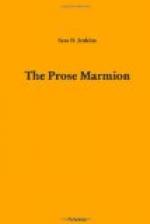Lord Byron now had entered the field of letters, and Scott, conscious of the power of his rival, determined to seek fame in other than poetic paths. This determination produced “Waverly,” whose success gave birth to Scott’s desire to be numbered among the landed gentry of the country. Under the influence of this passion, the novels now associated with his name followed with startling rapidity, and their growth developed in the author an unwillingness to be known as a penman writing for fortune. Literary fame was less dear to him than the upbuilding of a family name. The novels went for a time fatherless, but the baronial mansion, still one of the most famous shrines of the curious, grew into the stately proportions of Abbotsford.
In 1820. George IV. conferred upon Scott the baronetcy, dearer than all the plaudits of the public. But
“Giddy chance never
bears,
That mortal bliss shall
last for years,”
and the failure of banker and of publisher disclosed that the landed baronet had been a silent partner in the house of his printer for a quarter of a century, for whose debts Scott was liable to the extent of one hundred thousand pounds and to his bankers for enough more to make the entire debt one hundred fifty thousand pounds. Unappalled by the loss, Scott refused all offers of release from his creditors, and began to pay the debt by means of his pen, determined to preserve Abbotsford to his children’s children. At a dinner given in 1827, he threw off all disguise, and acknowledged the authorship of the Waverly novels.
His great exertions brought on paralysis. A visit to Italy failed to improve his condition, and he returned to die on the banks of the Tweed, and to be laid at rest in Dreyburg Abbey. He had paid one hundred thousand pounds of the debt, and the publishers of his works had sufficient confidence in their sale to advance the remaining fifty thousand pounds, the estate thus being left free of encumbrance.
Of his four children, two sons and two daughters, none left male issue. A grandchild, the wife of Robert Hope, was permitted by Parliament to assume the name of Scott, and her son Walter, at the age of twenty-one, was knighted by Queen Victoria.
Edinburgh has erected to his memory a most graceful monument, and Westminster Abbey a memorial. Visitors, under certain limitations, are permitted to visit the mansion, to see the enchanted library, and the famous study, to stray about the grounds where the famous writer spent the happiest, as well as the saddest, years of his life.
[Illustration: Abbotsford.]
THE PROSE MARMION.
CHAPTER I.
In all the border country that lies between England and Scotland, no castle stands more fair than Norham. Fast by its rock-ribbed walls flows the noble Tweed, and on its battled towers frown the hills of Cheviot.




